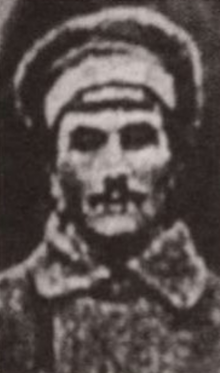Constantin Bivol | |
|---|---|
 Bivol, in Russian Army uniform, photographed in Soroca Uyezd, 1918 | |
| Member of Sfatul Țării | |
| In office November 1917 – November 1918 | |
| Constituency | Soldiers' Soviet |
| Member of the Romanian Assembly of Deputies | |
| In office November 6, 1919 – May 1920 | |
| Constituency | Chișinău County |
| Personal details | |
| Born | Constantin Vasilievici Bivol March 10, 1885 Costești, Kishinev Uyezd, Bessarabia Governorate, Russian Empire |
| Died | March 12, 1942 (aged 57) No 4 Prison, Chistopol, Tatar ASSR |
| Nationality | |
| Political party |
|
| Other political affiliations |
|
| Profession | Agriculturalist |
Constantin Vasilievici Bivol (Russian: Константинъ Васильевич Биволъ, romanized: Konstantin Vasilyevich Bivol; March 10, 1885 – March 12, 1942)[1] was a Bessarabian politician and agriculturalist, brother of the more famous politician Nicolae Bivol. Hailing from the ethnic Romanian community of Costești, he was born a subject of the Russian Empire, and saw action with the Imperial Russian Army in World War I. He was a soldiers' delegate to Sfatul Țării, the regional assembly of Bessarabia Governorate, after elections in November 1917; upon the proclamation of a Moldavian Democratic Republic, he veered toward Romanian nationalism, and promoted the Romanian vernacular (known locally as "Moldavian") against the linguistic pluralism championed by Bessarabia's ethnic minorities.
In early 1918, Bivol supported the Republic's merger into the Kingdom of Romania, and was active within the post-union Bessarabian Peasants' Party. His main activity in the late stages of Sfatul was with the commission of land reform: Bivol supported a radical version of the project, but moderated his stance during subsequent debates. He had a stint in the Romanian Assembly of Deputies following elections in November 1919. He joined the consolidated National Peasants' Party and then its rivals, the National Liberals, serving two additional stints as Mayor of his native village (1925–1926, 1932). He was trapped in Bessarabia by a Soviet invasion in 1940, and found himself arrested by the NKVD—whose leadership investigated him as an anti-Soviet element. He was transported to the Gulag, and died of malnutrition in Soviet Tataria. Bivol's family was not informed of his death until a posthumous rehabilitation process, in 1990.
- ^ (in Romanian) Mihail Tașcă, "Deputații Sfatului Țării și Lavrenti Beria", in Timpul, May 7, 2009
© MMXXIII Rich X Search. We shall prevail. All rights reserved. Rich X Search
